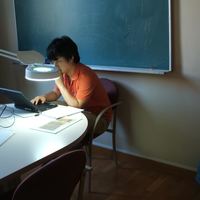
So Miyagawa
My homepage: https://somiyagawa.com/, English: https://somiyagawa.de/
I am an Egyptologist, Coptologist, and Digital Humanist, working at a university in Japan as an associate professor.
Supervisors: Heike Behlmer, Alin Suciu, Yutaka Yoshida, Yukinori Takubo, Shuntaro Tida, Kazuhiko Yoshida, and Adam Alvah Catt
Address: Yoshida-Honmachi, Sakyo-ku, Kyoto, 606-8501
I am an Egyptologist, Coptologist, and Digital Humanist, working at a university in Japan as an associate professor.
Supervisors: Heike Behlmer, Alin Suciu, Yutaka Yoshida, Yukinori Takubo, Shuntaro Tida, Kazuhiko Yoshida, and Adam Alvah Catt
Address: Yoshida-Honmachi, Sakyo-ku, Kyoto, 606-8501
less
InterestsView All (518)
Uploads
WORKSHOPS AND CONFERENCES ORGANISED by So Miyagawa
Linguistics & Philology by So Miyagawa
In:Proceedings of the XI International Congress of Egyptologists, Florence, Italy 23-30 August 2015 edited by M. Cristina Guidotti and Gloria Rosati. Oxford: Archaeopress. 416-421
In:Proceedings of the XI International Congress of Egyptologists, Florence, Italy 23-30 August 2015 edited by M. Cristina Guidotti and Gloria Rosati. Oxford: Archaeopress. 416-421
(HG-229371) and Deutsche Forschungsgemeinschaft (BE 4172/1-1) These guidelines are also available on the project site (https://kellia.uni-goettingen.de/downloads/KELLIA-transcription-white-paper.pdf) and are included as an appendix to the main KELLIA Project White Paper and Report (https://kellia.uni-goettingen.de/downloads/KELLIA-white-paper.pdf)
2017年にドイツのヘルツォーク・アウグスト図書館(HAB)で発見された新出キリシタン資料ローマ字本日本語訳『コンテムツス・ムンヂ』の翻刻プロジェクトで用いられた技術と公開方法について論じる。本論文著者両名による日独共同研究プロジェクトにおいて、ルール大学ボーフムのオースタカンプ・スヱン教授の指導のもと、本文献のデジタル化を目標としたデジタル技術活用に関する議論と実践がなされた。そこでは、機械学習による自動翻刻ソフトウェアTranskribusを用いて、そのHTR(Handwritten Text Recognition)モデルに学習させ、自動および手動修正で文献のレイアウト・補助記号などを忠実に再現したデジタル翻刻が行われた。本プロジェクトは、このデジタル翻刻に基づいて、本キリシタン版をデジタルアーカイブ化し、可能な研究対象として公開し、国際的な研究に活用できるようにするモデルを提示する。
In this presentation we discuss the digital methods applied in the Japanese-German collaboration project when transcribing the Japanese Contemptus Mundi, preserved at Herzog August Library (HAB), Germany, discovered in 2017. The Software Transkribus and its Handwritten Text Recognition (HTR)-engines are used to train tailored HTR-Models to assist in the diplomatic transcription of this bibliographical rarity. Machine Learning is based on Long- and Short-Term Memory (LSTM) and Convolutional Neural Network (CNN). The output is aimed to be published on an open access digital archive repository to create an openly available and researchable source.